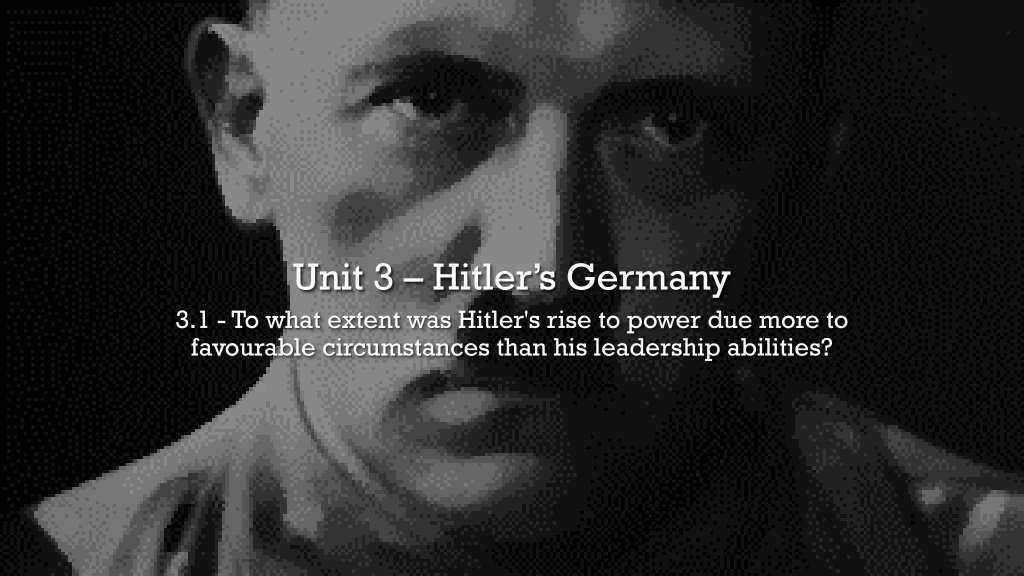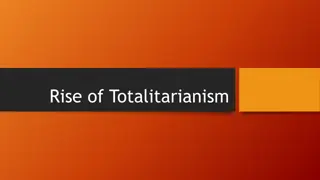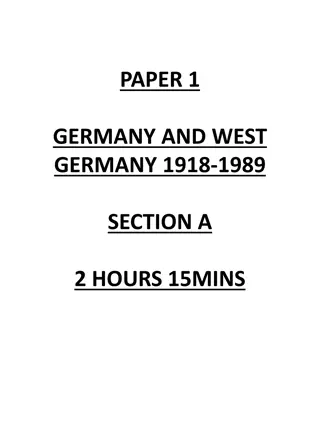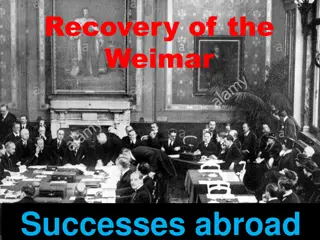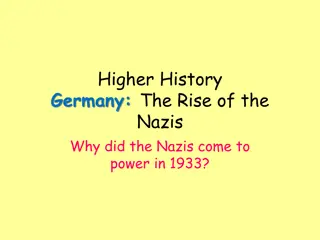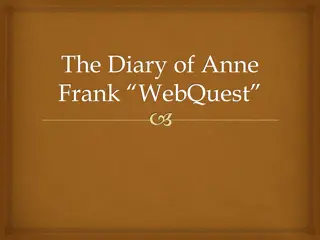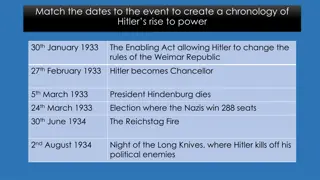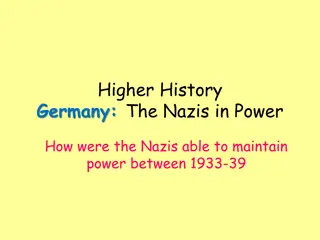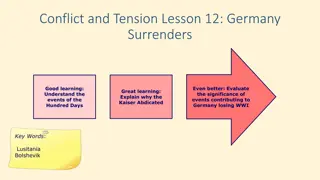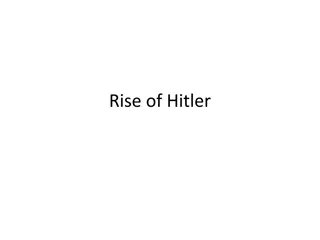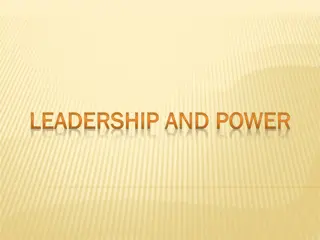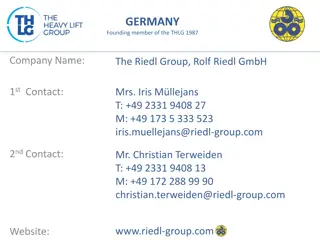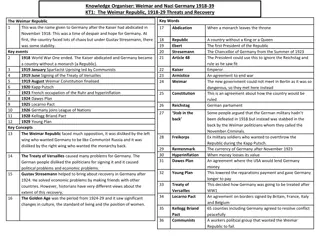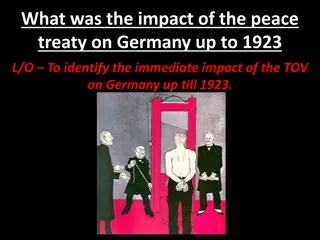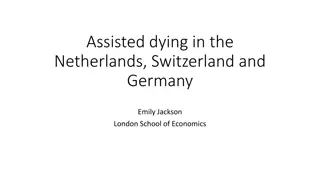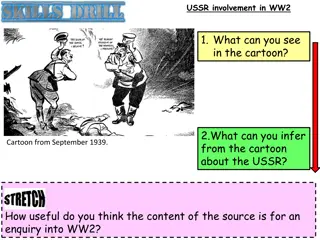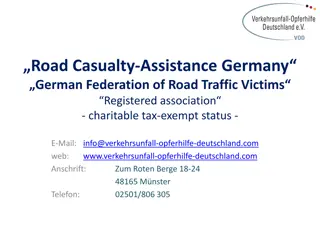The Factors Behind Hitler's Rise to Power in Germany
Adolf Hitler's rise to power in Germany was influenced by a combination of favorable circumstances and his leadership abilities. Weaknesses of the Weimar Republic, hyperinflation, and the impact of the Great Depression created a fertile ground for Hitler's ascent. The leadership of Gustav Stresemann in stabilizing the economy and international relations played a significant role. Hitler's charisma, political maneuvering, and ability to capitalize on the existing conditions were pivotal in his path to becoming Chancellor of Germany in 1933.
Uploaded on Oct 10, 2024 | 0 Views
Download Presentation

Please find below an Image/Link to download the presentation.
The content on the website is provided AS IS for your information and personal use only. It may not be sold, licensed, or shared on other websites without obtaining consent from the author. Download presentation by click this link. If you encounter any issues during the download, it is possible that the publisher has removed the file from their server.
E N D
Presentation Transcript
Unit 3 Hitlers Germany 3.1 - To what extent was Hitler's rise to power due more to favourable circumstances than his leadership abilities?
Background Information on Adolf Hitler Born in Austria, and was thus Austrian not German. A soldier in WWI. He won the Iron Cross, a medal for exceptional bravery in combat. Hitler joined the German Workers Party in 1919. Became the leader in 1921 and renamed it the National Socialist German Workers Party. Hitler tried to win support for the Nazis by peaceful means and his support grew in 1929 with the economic crisis. In 1933, the Nazi party won the election and Hitler became Chancellor of Germany. Adolf Hitler National Socialist Germany Workers Party
To what Extent was it due to Favourable Conditions? Weimar s weaknesses Hyperinflation Impact of the Great Depression
Weimar Weakness Background Information A shift from Dictatorship to a Democracy. It was difficult to make decisions because there were many parties in Reichstag (Parliament). Hard to pick a Chancellor (Prime Minister) who had support of most of Reichstag. New government was forced to accept guilt for WWI and pay reparations: a source of shame and hatred for many Germans. The weak Weimar government made the Germans lose confidence in the government and made them more willing to support parties like the Nazis.
Hyperinflation Enter Stresemann the Saviour Gustav Stresemann introduced a new currency called the Rentenmark and this ended the hyperinflationary crisis in November 1923. Eased tensions with France with Locarno Treaties and membership into the League of Nations. Gustav Stresemann
Hyperinflation Enter Stresemann the Saviour Stresemann was the Chancellor of the Weimar Republic from 1923 to 1924. Negotiated the Dawes Plan of 1924 and the Young Plan of 1929. Germany was allowed to join the League of Nations in 1926. 1924 and 1929 Plans 1924 Dawes Plan: borrow money from America to repay reparations and rebuild economy. 1929 Young Plan: reparations reduced by 75% and Germany given 58 years to pay.
Impact of the Great Depression How was Germany affected? Short-term loans to Germany from American Banks were recalled, triggering a crisis for German companies and forcing them to retrench workers. Unemployment skyrocketed from 1.3 million in 1928 to 5.3 million in 1932. By 1932, 30% of the employable workforce was unemployed. Weimar government was unable to take decisive action.
Impact of the Great Depression How were German politics affected? Widespread disillusionment with the Weimar system of Proportional Representation or in a capitalist style market economy. Rise in popular support for State control of the economy. Radical parties such as the Nazis and Communists received more consideration as a serious alternative to the Weimar Republic.
To what Extent was it due to Hitlers Personal Abilities? Charisma and Oratory Reorganisation of the Nazi Party Exploitation Skillfulness at making deals with politicians Nazi Ideology
Hitlers Charisma and Oratory Hitler was a powerful speaker and communicator, able to appeal to the emotions of the audience and identify with the people and paint his enemies as scapegoats: Weimar Republic, Communists and Jews. With his fiery delivery and focus on the common man, appeared sincere in his passion to set Germany right. Spoke damningly of Germany s enemies and boldly of her glorious future.
Reorganisation of the Nazi Party Establishing the SS and SA SA: Sturmabteilung aka. Stormtroopers. Their role was to disrupt the activities of rival parties such as the strikes of communists (thus reassuring businessmen) and protect Nazi candidates from reprisals. SS: Schutz-Staffel aka. Defence Corps. Hitler s personal bodyguard loyal only to him, not the Nazi Party or Germany. This gave Germans the impression that the Nazis were capable of restoring stability in Germany. Schutz-Staffel Sturmabteilung
Reorganisation of the Nazi Party Usage of Propaganda (The Sieg Heil!) Nazi propaganda was headed by Joseph Goebbels. It involved the use of pictures, posters, catchphrases, uniforms, insignias, music, marches, processions and the Nazi greeting Sieg Heil, meaning hail victory . Consistent appeals to emotion and the vision of a grand, unified Nazi Party, marching towards inevitable success. Joseph Goebbels
Who was in charge just before Hitler? President Paul Von Hindenburg President: 1925-1934 Chancellor Franz Von Papen Chancellor: 1932 Vice-chancellor: 1933-1934
The German Parliament The German Parliament was known as the Reichstag. The Chancellor of Germany is the equivalent of the Prime Minister in Singapore. The Parliament is considered a legislative assembly. Hitler became the Chancellor of Germany in 1933. Chancellor Adolf Hitler Chancellor: 1933
Appeal of Nazi Ideology Promises and Propaganda July 1932 Election poster We build! The Nazis promised to provide work, freedom and bread. They accuse the opposing parties as using terror, corruption, lies and other strategies as a basis for their government. Nazi propaganda poster offering work (arbeit), freedom (freiheit) and bread (brot) as opposed to the empty promises of their opponents
Skillfulness at Manipulating Politicians Deal-making his way into the Chancellorship Hitler spends first year as a leader of a coalition, but will exploit later events to consolidate his power. This strategy enabled Hitler to stay in the competition and maintain his political influence in the Reichstag. July 1932 and November 1932 Overlooked for Chancellor role due to his radical background January 1933 Allowed to become Chancellor on the condition that he supported their policies and kept the communists from taking over
Conclusion Favourable Conditions and/or Hitler s abilities? Key Point: As comprehensive and extreme Hitler s rhetoric and propaganda were, the Nazis were able to gain a majority of the German vote. Hitler s self-won popularity and cunning did help him win power, but it was favourable conditions that first brought him sufficient votes and political clout.
